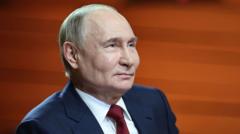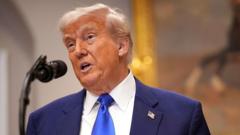The EU Trade Commissioner has called for a respect-driven trade deal with the US, reacting to President Trump's threat of imposing a startling 50% tariff on EU goods, which could damage both economies.**
EU Urges Respect Amid Trump's Threat of 50% Tariffs**

EU Urges Respect Amid Trump's Threat of 50% Tariffs**
European Union officials stress the importance of mutual respect in trade negotiations following President Trump's aggressive tariff proposal.**
The European Union's trade chief, Maros Sefcovic, has firmly reiterated the bloc's commitment to negotiating a trade agreement with the United States founded on "respect" rather than "threats." This stance arises in the wake of US President Donald Trump's alarming announcement of a potential 50% tariff on goods imported from the EU.
Following discussions with US Trade Representative Jamieson Greer and Commerce Secretary Howard Lutnick, Sefcovic stated, "EU-US trade is unparalleled and must be guided by mutual respect, not threats. We stand ready to defend our interests." Trump's comments earlier that day reflected a growing impatience with the pace of negotiations, indicating that that his plan to implement tariffs would proceed on June 1st.
In a social media post, Trump claimed that dialogue with the EU was stagnant and hinted he was not seeking a new deal but would consider a delay if a significant European investment materialized in the US. The EU, whose trade relationships contributed over $600 billion to US imports last year, echoed concerns from member states about the repercussions of higher tariffs, which could disrupt economic stability on both sides.
Irish Prime Minister Micheál Martin advocated for continued negotiations, emphasizing, "We do not need to go down this road," while French Trade Minister Laurent Saint-Martin maintained a call for de-escalation.
Despite Trump's threats, the EU has also hinted at potential retaliatory tariffs on over $20 billion worth of US goods, though these measures are currently on hold. Trump's ongoing critique of EU trade policies centers on an alleged trade imbalance, particularly in the automotive and agricultural sectors.
As tensions escalate, markets reacted negatively, with notable declines in share prices across US and EU exchanges, highlighting the economic fragility surrounding the ongoing trade disputes.


















